Tooth extraction is a stressful situationEven if the surgery is under the influence of painkillers.
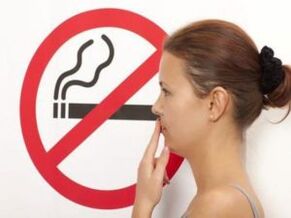
and heavy smokersOf course, after experiencing emotional excitement, they will smoke and try to relax.
This is their idea of how to relieve the pain that usually begins to develop when the anesthetic gradually disappears.
It’s just not worth doing.In the following article, we will discuss whether it is possible to smoke after tooth extraction. Why is it strictly forbidden to smoke immediately after tooth extraction? We will provide suggestions for various situations.
The effect of smoking and nicotine on recovery after tooth extraction
Remember!The composition of cigarette smoke contains a lot of chemical elements and compounds that are harmful to the whole body, and it also hinders the healing process of wounds.
Nicotine has a strong irritation to the edge of the socket remaining after surgery.
It shrinks the blood vessels that carry blood to the wound.
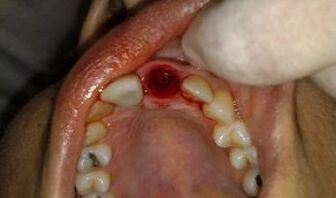
The longer and more intense the effect of tobacco on the wound, the longer it will take to heal.
Smoking can also negatively affect the blood clotting process.
As a result, the wound stays open for a long time and continues to bleed. As a result, the risk of contracting various infections has increased several times.
Inflammation is the result of infection in the wounded oral cavity.
Symptoms and signs: general malaise, headache, fever, red gums, acute pain.
How long is smoking ban?
It is worth noting!The dentist recommends that you at least pay attention to the shortest time to quit smoking after tooth extraction-2-3 hours.
After this time, you can smoke, but only if the bleeding has completely stopped.
When can I smoke after wisdom tooth extraction?
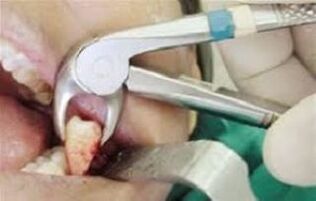
Wisdom tooth extraction (picture 8) is a long and arduous process.
The characteristic of this tooth is that the root is too long, too long, usually curved, and sometimes it must be partially removed.
After this type of surgery, there are still extensive wounds on the gums.Dentists often suture and drain them.
In addition, doctors often prescribe antibiotics to prevent inflammation.
Stay informed!When leaving the medical room, smokers must ask the dentist when to smoke the first cigarette and start eating.
The doctor’s answer will directly depend on the patient’s health, surgical procedure, etc. Generally, all suggestions are purely personal.
How long should I smoke after stitching?
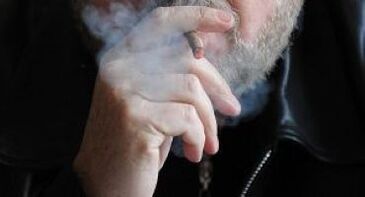
If the doctor sutures the tooth after extraction, he advises not to lift the first suction within 2-10 days.
This period of time is necessary for complete wound healing and postoperative suture absorption.
Failure to follow the recommended smoking time may cause postoperative complications.
Even a cigarette can delay wound healing.
How long can I smoke?The ideal choice is 2 to 10 days without resuming addiction.
Shisha and electronic cigarettes
Waterpipe, like electronic cigarettes, is contraindicated for at least 3 hours after surgery. The heated smoke or steam can irritate the soft tissues and may cause bleeding to occur again.
What consequences will you face?
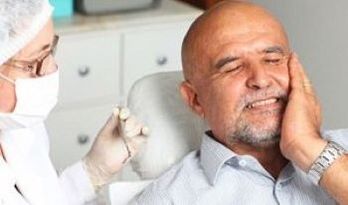
Each patient has the right to independently decide whether or not to smoke. However, before taking the first puff, it is recommended that every smoker is familiar with the possible consequences if the dentist’s advice is not followed.
Most of them can cause serious health problems and may even be fatal.
There are 3 complications that are particularly dangerous for smokers:
- Osteomyelitis.
Purulent inflammation of bone tissue caused by infection. This disease is very serious and can cause death if not treated properly. - Alveolar osteitis(dry nest).
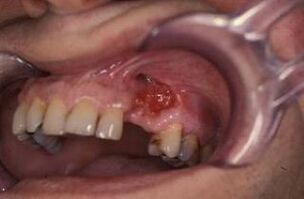 There is no blood clot in the nest, which is a natural barrier for infection to enter the hole. Blood clots may "pop up" under the influence of nicotine, which is characterized by its ability to increase blood pressure in blood vessels.
There is no blood clot in the nest, which is a natural barrier for infection to enter the hole. Blood clots may "pop up" under the influence of nicotine, which is characterized by its ability to increase blood pressure in blood vessels. - Alveolitis.
After the tooth is extracted, the alveolar and nearby tissues become inflamed. The area of the hole began to be severely injured, swollen and covered with a gray coating, the patient's body temperature increased, the submandibular lymph nodes increased, and he could not eat due to acute pain.
What is not recommended?
Need to know!After tooth extraction, there are some suggestions to follow:
- Brush your teeth, rinse your mouth for 24 hours after surgery. Such an event will provoke the "washout" of blood clots.
- Take a hot bath, visit the bathhouse and sauna.High temperatures can cause pressure to rise, which can lead to new bleeding.
- Body load.Exercise can also cause high blood pressure.
- Drinking alcoholI am another factor that may cause hypertension and therefore bleeding from the wound.
- Eat immediately after extraction: It is best to wait 2-3 hours.
- It is forbidden for dishes to be too cold or too hot, they may harm the mouth. It is best not to eat spicy food. Do not open your mouth wide after stitching: muscle tension can cause differences.
- It’s best not to drivebecause the painkillers used during the extraction process can make you drowsy.

Important! After the tooth is extracted, the patient can apply ice on the cheek to relieve the pain, and take the painkiller recommended by the doctor (except aspirin).
If the bleeding has completely stopped, the tampon soaked in the antiseptic can be removed within 20 minutes.
If the tampon stays in the wound longer, it may become an ideal breeding ground for bacteria.
Please also read the article that helps to study the issue in more detail, this will make prevention faster and better:
- How to eliminate the smell of cigarettes in the mouth;
- Smoker's toothpaste;
- Language and smoking;
- There are smoke spots on the teeth.
Comments
Here are some comments. If you have something to say-leave your feedback in the comments below the article, it will be very useful to our readers.
I was tortured by the tooth of wisdom: I have been sick and started to collapse. My dentist recommends removal as the only option.
I immediately agree: I am tired of constantly drinking painkillers. The operation went well, but the stitches must still be stitched.
But when the doctor mentioned quitting smoking, I was surprised! And I smoke a lot, and cigarettes help cope with irritation, anger and even pain.
Why should I resist resistance after leaving the hospital! But willpower prevailed. The result is a successful healing process.
My tooth was pulled out. The doctor gave postoperative advice, which caught my attention, that is, it is better to quit smoking for 2 to 3 hours.
I couldn't help it even for half an hour-I lit a cigarette: blood leaked from the wound almost immediately, and it didn't stop.
I have to see the doctor again for help. It is a good thing for me to go back to the hospital, because everything could have ended tragically.
The dentist said that because nicotine swallows the edges of nicotine, the nicotine cannot be tightened, so there is a high risk of wound infection.
Herbal infusion bath can relieve the patient's condition and accelerate the healing process.
Pour a bag of chamomile into boiling water, infuse it for half an hour, and then cool to room temperature. The infusion should enter the mouth and remain for about two minutes without flushing.
No matter how dependent you are on smoking, you should use common sense.
The correct and only correct step is to follow all the doctor’s recommendations.
Otherwise, the negligent patient will have to pay a high price for disobedience-the price of his own health. Is the nicotine puff worth it?























